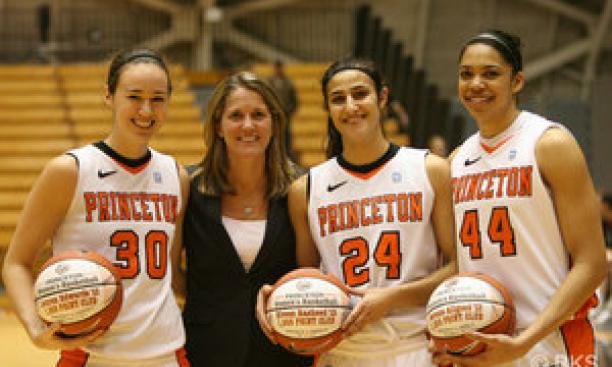

Coach Courtney Banghart with her team's three 1,000-point scorers: Lauren Edwards '12, left; Niveen Rasheed '13, second from right; and Devona Allgood '12, right. (Photo: Beverly Schaefer)
This week was filled with milestones for the women’s basketball program. On Monday, Princeton was rated No. 24 in the Associated Press poll, becoming the first Ivy League team ever listed in the national rankings. And that evening, the Tigers earned a No. 9-seed in the NCAA Tournament, the best seeding ever for a team from the Ancient Eight.
But those feats will not be well remembered unless the team achieves another milestone on Saturday: the first NCAA Tournament victory in program history. After losing by double digits to St. John’s and Georgetown in 2010 and 2011, respectively, this season marks the best chance yet for Princeton to win in the postseason.
Head coach Courtney Banghart summed up her view in the Ivy League postseason media teleconference earlier this week: “If we do what we do well, we’ll be a really good team.”
Fans tuning in to the Tigers’ first-round game against No. 8-seed Kansas State (11:20 a.m. Saturday, ESPN2 or ESPN3) who are expecting a flowing, pretty game of basketball likely will be disappointed. Both teams are defense-oriented and will try to make Saturday’s game as ugly as possible. Kansas State enters the game allowing 56.7 points per game; Princeton holds teams to 35 percent shooting and has not given up more than 60 points in a game since the calendar read 2011.
The typical profile of an Ivy League team is “soft,” but that does not describe this year’s Tigers, who rebound better than they do anything else. Over the course of the season, Princeton grabbed 59.6 percent of total missed shots, the third-best mark in the nation; Kansas State was near the average at 49.6 percent, though against tougher competition. Princeton already broke the Ivy League mold by putting up even rebounding numbers against Georgetown and St. John’s, but they’ll need a sizable advantage this year.
That is largely because Kansas State should be able to overcome the next-biggest strength of Princeton’s defense, a swarming press designed to force turnovers. The Tigers induced 19.4 miscues per game, but the Wildcats gave it away only 14.5 times and have experience facing high-pressure defenses.
“There are no bad teams in the NCAA Tournament. [Kansas State] played in a really good conference, so they’re battle-tested. They’re physical, they’ve played against some of the best teams in the country, and they won’t know a lot about us, which is exciting.”
— Courtney Banghart
“There are no bad teams in the NCAA Tournament. [Kansas State] played in a really good conference, so they’re battle-tested,” Banghart said. “They’re physical, they’ve played against some of the best teams in the country, and they won’t know a lot about us, which is exciting.”
One thing Princeton shouldn’t have to worry about is a repeat of last year’s three-point barrage, when Georgetown used six first-half triples to blow the game open. The Wildcats made only 28.7 percent of their outside shots while taking a surprisingly high number of them, behavior Princeton will want to encourage. The more the Tigers can limit 6-foot, 2-inch forward and leading scorer Jalana Childs’ touches, the better – nobody else in purple and white has made 41 percent of her shots.
On the other end of the court, the Tigers have relied on Niveen Rasheed ’13 all season, but the star junior will not scare a defense that has faced the 6-foot-8-inch Baylor center Brittney Griner three times. The most important player on Saturday may be guard Lauren Edwards ’12, Princeton’s most consistent outside threat. Her team has made only five of 28 three-point attempts in its two tournament appearances despite several open looks, but the Tigers may not be able to score enough to beat a Big 12 defense without some three-pointers.
If the Tigers win, they will almost certainly face No. 1-seed Connecticut in the second round of the tournament — an opportunity to test themselves against one of the sport’s elite program. But with a loss, Princeton will face a long 51 weeks to try to get back where it stands right now.

Kevin Whitaker ’13 is an economics major and Daily Princetonian sports editor.
